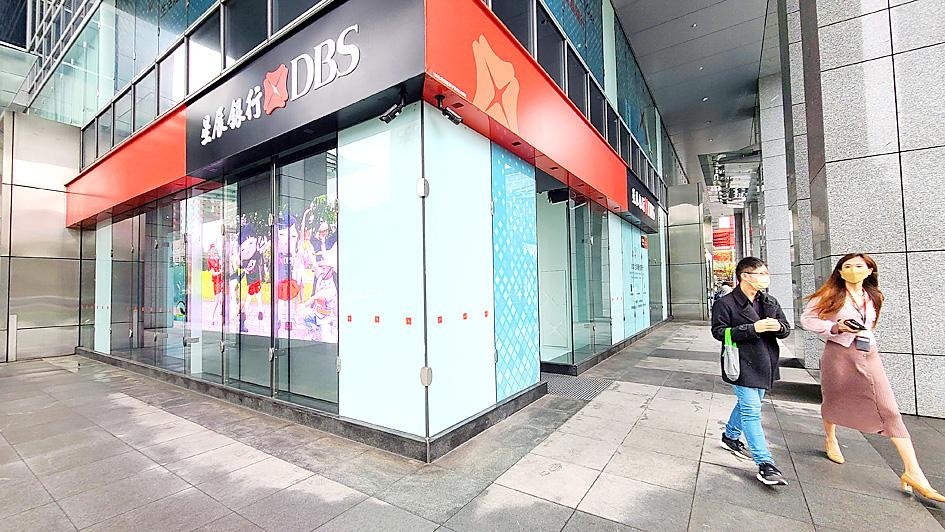DBS Bank Taiwan (星展台灣) yesterday announced that it has offered polyester and textiles producer Far Eastern New Century Corp (FENC, 遠東新世紀) a blue loan of NT$1 billion (US$33.65 million), which would help FENC recycle more marine waste and implement ocean protection projects, the bank said.
The loan is not only the first blue loan in Taiwan, but also the first blue loan provided by Singapore-based DBS Group Holdings Ltd, the local unit of DBS Group told a news conference yesterday.
FENC has since 2016 collaborated with Adidas AG and non-governmental organization Parley for the Oceans to commercialize trainers using recycled plastic dredged from the oceans to raise awareness about the environmental issue, the bank said.

Photo: Fang Pin-chao, Taipei Times
By the end of last year, they had reprocessed more than 11,000 tonnes of marine waste and used the recycled materials to produce 60 million sports shoes, the bank said.
“Sustainability and innovation are already embedded in the Far Eastern New Century’s DNA,” FENC chief financial officer David Wang (王健誠) told a news conference.
The blue loan would enable FENC to devote itself more to ocean-friendly and water resource protection initiatives, so that it can achieve the UN’s Sustainable Development Goals, Wang said.
As the market leader in sustainable finance in Taiwan, FENC is the only local company that has issued green bonds, sustainability bonds and social bonds in Taiwan, Wang said.
While green loans or sustainability-linked loans have gained acceptance in Taiwan in the past few years, blue loans are discussed a lot less as they are only offered to companies focused on improved water treatment and ocean protection, DBS Bank’s data showed.
While the proceeds of green loans and sustainability-linked loans can only be used for green power projects or achieving sustainability goals, blue loans can only be used for projects such as water sanitation, clean water supply, ocean friendly products or marine ecological restoration, the bank said.
The bank offered the innovative financing tool not because it thinks the market has great potential, but because there is a necessity to promote such tools for marine sustainability, DBS Bank head of institutional banking Tony Luo (羅綸有) said.
“As Taiwanese companies have become stronger, they can do more to protect the ocean... Though Taiwan has great precipitation, there is still lots to be improved in the conservation of water resources,” Luo said.

Shares in Taiwan closed at a new high yesterday, the first trading day of the new year, as contract chipmaker Taiwan Semiconductor Manufacturing Co (TSMC, 台積電) continued to break records amid an artificial intelligence (AI) boom, dealers said. The TAIEX closed up 386.21 points, or 1.33 percent, at 29,349.81, with turnover totaling NT$648.844 billion (US$20.65 billion). “Judging from a stronger Taiwan dollar against the US dollar, I think foreign institutional investors returned from the holidays and brought funds into the local market,” Concord Securities Co (康和證券) analyst Kerry Huang (黃志祺) said. “Foreign investors just rebuilt their positions with TSMC as their top target,

H200 CHIPS: A source said that Nvidia has asked the Taiwanese company to begin production of additional chips and work is expected to start in the second quarter Nvidia Corp is scrambling to meet demand for its H200 artificial intelligence (AI) chips from Chinese technology companies and has approached contract manufacturer Taiwan Semiconductor Manufacturing Co (TSMC, 台積電) to ramp up production, sources said. Chinese technology companies have placed orders for more than 2 million H200 chips for this year, while Nvidia holds just 700,000 units in stock, two of the people said. The exact additional volume Nvidia intends to order from TSMC remains unclear, they said. A third source said that Nvidia has asked TSMC to begin production of the additional chips and work is expected to start in the second

REVENUE PERFORMANCE: Cloud and network products, and electronic components saw strong increases, while smart consumer electronics and computing products fell Hon Hai Precision Industry Co (鴻海精密) yesterday posted 26.51 percent quarterly growth in revenue for last quarter to NT$2.6 trillion (US$82.44 billion), the strongest on record for the period and above expectations, but the company forecast a slight revenue dip this quarter due to seasonal factors. On an annual basis, revenue last quarter grew 22.07 percent, the company said. Analysts on average estimated about NT$2.4 trillion increase. Hon Hai, which assembles servers for Nvidia Corp and iPhones for Apple Inc, is expanding its capacity in the US, adding artificial intelligence (AI) server production in Wisconsin and Texas, where it operates established campuses. This

US President Donald Trump on Friday blocked US photonics firm HieFo Corp’s US$3 million acquisition of assets in New Jersey-based aerospace and defense specialist Emcore Corp, citing national security and China-related concerns. In an order released by the White House, Trump said HieFo was “controlled by a citizen of the People’s Republic of China” and that its 2024 acquisition of Emcore’s businesses led the US president to believe that it might “take action that threatens to impair the national security of the United States.” The order did not name the person or detail Trump’s concerns. “The Transaction is hereby prohibited,”